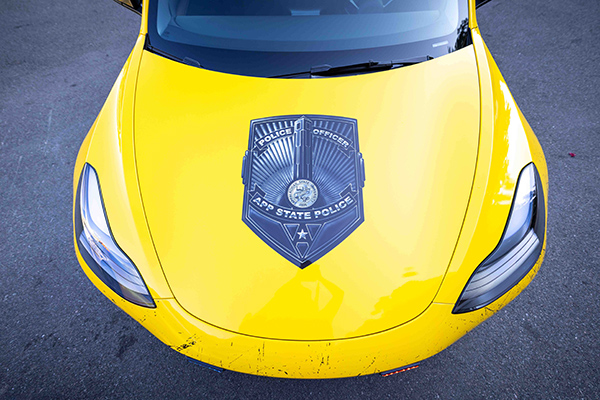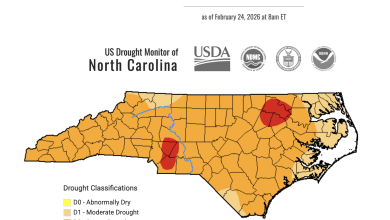
Last Updated on November 27, 2023 10:31 am
BOONE, N.C. — This fall, the Appalachian State University Police Department placed its first two electric patrol vehicles in service — among the first for North Carolina police departments. The department plans to gradually replace its gas-powered patrol cars with electric vehicles (EVs), a strategic move to reduce carbon emissions and cut costs.
Two Tesla Model 3 sedans are currently on the road, while four Tesla Model Y sedans have been delivered and are being equipped for service. In planning for patrol car replacements, App State Police worked with the university’s Office of Sustainability and Facilities Operations to compare EVs with gas-powered vehicles, assessing estimated emissions and costs. Experts from these areas calculated that phasing out App State’s gas-powered police cars and replacing them with EVs will save more than $16,000 per vehicle over five years, and each EV will avoid nearly 35 metric tons of carbon emissions over the same time period.
The cost of each Tesla Model 3 is approximately $48,880. The price for a Ford Explorer Police Interceptor, a gas-powered model, is approximately $44,290, but, as Andy Stephenson, App State’s director of public safety and chief of police pointed out, the savings over time are significant.
“While the purchase price of the Model 3 is about $4,600 higher than the Interceptor, the energy costs quickly add up,” said Stephenson. “The estimated annual electricity cost to power each EV is just over $700, compared with our average annual fuel and oil costs of about $5,000 for the gas-powered patrol vehicles currently in the fleet.”
Stephenson added that the impact to the police department budget will be both immediate and lasting. “The switch of our entire fleet to EVs will equate to hundreds of thousands of dollars in savings,” he said.
He noted that App State Police’s decision to transition to EVs was further influenced by challenging supply chain issues, as the Ford Explorer Police Interceptors are not expected to be available until 2025 and the company no longer makes its Taurus Police Interceptor sedan. In comparison, the Tesla Model 3 EVs were available within one month after App State Police placed an order, and the Tesla Model Y sedans were available even faster — within three days.


In addition to the cost savings, App State’s Office of Sustainability estimates that each patrol EV could help App State Police contribute to App State’s climate action plan, “AppCAP 1.0: A Vision for Climate Neutrality,” by avoiding almost 7 metric tons of carbon emissions per year — more than three times the carbon output of the average App State commuter.
The department’s transition from gas-powered to electric patrol vehicles also supports the university’s strategic plan priority of strengthening resilience and sustainability.
“I want to thank Chancellor Sheri Everts and her leadership team for their ongoing support as our police department continues to innovate and set new standards for policing — including those that challenge the status quo and that positively impact the university community in ways that go beyond law enforcement,” said Stephenson.
Fuel and oil estimates for App State Police patrol cars were derived from App State Facilities Operations’ Motor Pool data for the average patrol car, which is driven 20,136 miles per year. Electricity cost estimates for EVs were shared from App State’s Office of Sustainability and are based on 3.6 cents per mile for the estimated 20,136 miles per year.
What do you think?
Share your feedback on this story.
About the App State Police Department
Appalachian State University’s official policing agency — the App State Police Department — supports the university’s academic mission by working in partnership with the campus community to prevent crime, solve problems and improve the quality of life on campus. The department’s philosophy is one of proactive community engagement, collaboration and customer service, holding the safety and health of App State’s community members as its top priorities. State-certified police officers, security officers and civilian employees compose the department, and this team of professionals helps to create and maintain an inclusive sense of belonging for all members of the App State Community — students, faculty, staff and visitors. Additionally, through its efforts, the department aims to be a leader in innovative public safety ideas and strategies. Learn more at https://police.appstate.edu.
About Sustainability at Appalachian
Appalachian State University’s leadership in sustainability is known nationally. The university’s holistic, three-branched approach considers sustainability economically, environmentally and equitably in relationship to the planet’s co-inhabitants. The university is an active steward of the state’s interconnected financial, cultural and natural resources and challenges students and others think critically and creatively about sustainability and what it means from the smallest individual action to the most broad-based applications. The university offers both undergraduate and graduate academic degree programs that focus on sustainability. In addition, 100 percent of Appalachian’s academic departments offer at least one sustainability course or course that includes sustainability, and all students graduate from programs that have adopted at least one sustainability learning outcome. Learn more at https://appstate.edu/sustainability.
About Appalachian State University
As the premier public undergraduate institution in the Southeast, Appalachian State University prepares students to lead purposeful lives. App State is one of 17 campuses in the University of North Carolina System, with a national reputation for innovative teaching and opening access to a high-quality, affordable education for all. The university enrolls more than 21,000 students, has a low student-to-faculty ratio and offers more than 150 undergraduate and 80 graduate majors at its Boone and Hickory campuses and through App State Online. Learn more at https://www.appstate.edu.

















